 Backend Development
Backend Development PHP Tutorial
PHP Tutorial How to avoid client-side script exceptions in PHP language development?
How to avoid client-side script exceptions in PHP language development?In web development, client-side script exceptions are a common problem. As a server-side language, PHP can optimize web page performance by using some technical means, while avoiding client-side script exceptions and improving the reliability and stability of the website. This article will introduce how to avoid client-side script exceptions in PHP language development.
- Using HTTP response headers
The HTTP response header is the information returned by the server through the response header when the client accesses the server through an HTTP request. In PHP development, you can optimize page performance by setting HTTP response headers while avoiding client-side script exceptions. The following are several common HTTP response headers:
- Content-Type
Content-Type is used to specify the media type in the HTTP response body. In PHP development, you can use the Content-Type header to specify the returned content type to avoid script exceptions caused by the browser being unable to recognize the file type. For example, if the data returned is JSON format, you can add the following code in the PHP code:
header('Content-Type: application/json');
This will tell the browser The returned content is data in JSON format.
- Cache-Control
Cache-Control is used to control the caching behavior of responses. In PHP development, you can set the Cache-Control header to control the caching of web pages to avoid client-side script exceptions. For example, you can add the following code to your PHP code:
header('Cache-Control: no-cache, no-store, must-revalidate');
This will tell the browser not to Caching the web page requires the server to re-fetch the data each time.
- Content-Security-Policy
Content-Security-Policy is used to control the content security policy of the page. In PHP development, you can set the Content-Security-Policy header to limit the sources of resources referenced by the page to avoid the injection and execution of malicious scripts. For example, you can add the following code to your PHP code:
header("Content-Security-Policy: script-src 'self'");
This will tell the browser to only allow files from the same Load the script under the domain name.
- Using HTTP cookies
HTTP cookies are small pieces of text stored in the client browser that can be used to store user information and status. In PHP development, HTTP cookies can be used to record user login status, store user preferences and options and other information to avoid client-side script exceptions. For example, the following code can be used in PHP code to set cookies:
setcookie("username", "John", time() 3600);
This will be displayed in the client browser Stores a cookie named "username" that is valid for one hour.
- Using the PHP framework
The PHP framework is a software library that provides templates and function libraries that can help developers speed up the development process while avoiding common security vulnerabilities and Client script exception. Common PHP frameworks include Laravel, Symfony, CodeIgniter, etc. When developing using the PHP framework, you can directly call the functions provided by the framework and automatically handle security issues and client-side script exceptions.
- Use coding specifications
Coding specifications are documents that stipulate the rules and style of code writing. Using coding standards can make the code more standardized, readable, and maintainable, and can also avoid common security vulnerabilities and client-side script exceptions. Commonly used coding standards in PHP development include PSR-2 and PSR-4.
Summary:
Client-side script exceptions are a common problem encountered in web development. In PHP development, you can avoid client-side script exceptions and improve the reliability and stability of web pages by using technical means such as HTTP response headers, HTTP cookies, PHP frameworks, and coding standards.
The above is the detailed content of How to avoid client-side script exceptions in PHP language development?. For more information, please follow other related articles on the PHP Chinese website!
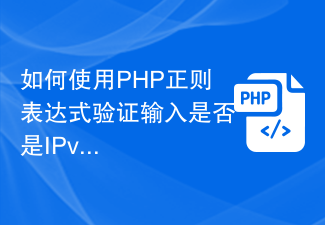 如何使用PHP正则表达式验证输入是否是IPv6地址Jun 25, 2023 am 09:37 AM
如何使用PHP正则表达式验证输入是否是IPv6地址Jun 25, 2023 am 09:37 AMIPv6是指InternetProtocolVersion6,是用于互联网通信的一种IP地址协议。IPv6地址是由128个比特位组成的数字,通常用8个16进制数分组表示。在PHP中,可以使用正则表达式来验证输入是否是IPv6地址,下面就介绍一下如何使用PHP正则表达式验证IPv6地址。第一步:了解IPv6地址的格式IPv6地址由8个16进制块组成,每个
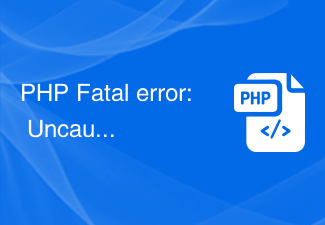 PHP Fatal error: Uncaught exception 'Exception'解决方法Aug 18, 2023 pm 03:28 PM
PHP Fatal error: Uncaught exception 'Exception'解决方法Aug 18, 2023 pm 03:28 PMPHP是一种广泛使用的服务器端编程语言,它可以为网站提供强大的动态功能。但是,在实践中,开发人员可能会遇到各种各样的错误和异常。其中一个常见的错误是PHPFatalerror:Uncaughtexception'Exception'。在本文中,我们将探讨这个错误的原因以及如何解决它。异常的概念在PHP中,异常是指程序在运行过程中遇到的意外情况,导致
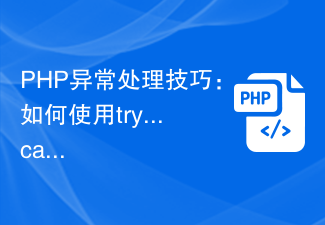 PHP异常处理技巧:如何使用try...catch块捕获和处理多个异常Jul 29, 2023 pm 01:05 PM
PHP异常处理技巧:如何使用try...catch块捕获和处理多个异常Jul 29, 2023 pm 01:05 PMPHP异常处理技巧:如何使用try...catch块捕获和处理多个异常引言:在PHP应用程序开发中,异常处理是非常重要的一环。当代码中发生错误或异常时,合理的异常处理能够提高程序的健壮性和可靠性。本文将介绍如何使用try...catch块捕获和处理多个异常,帮助开发者进行更加灵活和高效的异常处理。异常处理介绍异常是指在程序运行时产生的错误或特殊情况。当异常出
 如何在PHP语言开发中避免XSS攻击?Jun 10, 2023 pm 04:18 PM
如何在PHP语言开发中避免XSS攻击?Jun 10, 2023 pm 04:18 PM随着互联网的普及,网站安全问题越来越受到重视。其中,XSS攻击是最为常见和危险的安全威胁之一。XSS全称Cross-sitescripting,中文翻译为跨站脚本攻击,指攻击者在故意插入一段恶意脚本代码到网页中,从而影响到其他用户。PHP语言是一种广泛应用于Web开发的语言,那么在PHP语言开发中如何避免XSS攻击?本文将从以下几个方面阐述。一、参数化查询
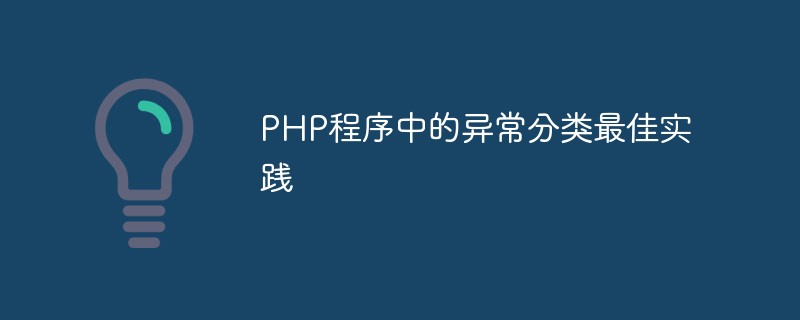 PHP程序中的异常分类最佳实践Jun 06, 2023 am 08:01 AM
PHP程序中的异常分类最佳实践Jun 06, 2023 am 08:01 AM在编写PHP代码时,异常处理是不可或缺的一部分,它可以使代码更加健壮和可维护。但是,异常处理也需要谨慎使用,否则就可能带来更多的问题。在这篇文章中,我将分享一些PHP程序中异常分类的最佳实践,以帮助你更好地利用异常处理来提高代码质量。异常的概念在PHP中,异常是指在程序运行时发生的错误或意外情况。通常情况下,异常会导致程序停止运行并输出异常信息。
 如何在PHP中使用正则表达式验证输入是否是IPv4地址Jun 24, 2023 am 09:20 AM
如何在PHP中使用正则表达式验证输入是否是IPv4地址Jun 24, 2023 am 09:20 AMPHP作为一种流行的服务器端编程语言,提供了一些强大的工具来验证输入数据的正确性。在本篇文章中,我们将重点讨论如何使用正则表达式来验证输入是否是IPv4地址。首先,什么是IPv4地址?IPv4地址是指一个32位二进制数,通常被分成四个8位二进制数,用"."分隔,表示为十进制形式。例如,127.0.0.1是一个IPv4地址。现在,我们来看看如何使用正则表达式来
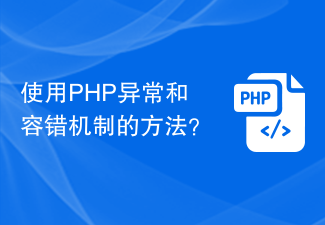 使用PHP异常和容错机制的方法?Jun 30, 2023 am 10:13 AM
使用PHP异常和容错机制的方法?Jun 30, 2023 am 10:13 AM如何使用PHP的异常处理和容错机制?引言:在PHP编程中,异常处理和容错机制是非常重要的。当代码执行过程中出现错误或异常的时候,可以使用异常处理来捕获和处理这些错误,以保证程序的稳定性和可靠性。本文将介绍如何使用PHP的异常处理和容错机制。一、异常处理基础知识:什么是异常?异常是在代码执行过程中出现的错误或异常情况,包括语法错误、运行时错误、逻辑错误等。当异
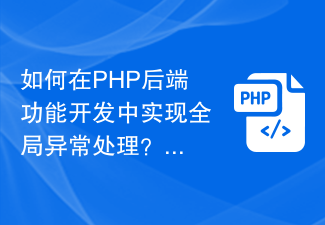 如何在PHP后端功能开发中实现全局异常处理?Aug 05, 2023 pm 03:36 PM
如何在PHP后端功能开发中实现全局异常处理?Aug 05, 2023 pm 03:36 PM如何在PHP后端功能开发中实现全局异常处理?在PHP后端开发中,异常处理是非常重要的一环。它可以帮助我们捕获程序中的错误,并进行适当的处理,从而提高系统的稳定性和性能。本文将介绍如何在PHP后端功能开发中实现全局异常处理,并提供相应的代码示例。PHP提供了异常处理的机制,我们可以通过try和catch关键字来捕获异常并进行相应的处理。全局异常处理指的是将所有


Hot AI Tools

Undresser.AI Undress
AI-powered app for creating realistic nude photos

AI Clothes Remover
Online AI tool for removing clothes from photos.

Undress AI Tool
Undress images for free

Clothoff.io
AI clothes remover

AI Hentai Generator
Generate AI Hentai for free.

Hot Article

Hot Tools

PhpStorm Mac version
The latest (2018.2.1) professional PHP integrated development tool

SublimeText3 Mac version
God-level code editing software (SublimeText3)

mPDF
mPDF is a PHP library that can generate PDF files from UTF-8 encoded HTML. The original author, Ian Back, wrote mPDF to output PDF files "on the fly" from his website and handle different languages. It is slower than original scripts like HTML2FPDF and produces larger files when using Unicode fonts, but supports CSS styles etc. and has a lot of enhancements. Supports almost all languages, including RTL (Arabic and Hebrew) and CJK (Chinese, Japanese and Korean). Supports nested block-level elements (such as P, DIV),

Notepad++7.3.1
Easy-to-use and free code editor

Safe Exam Browser
Safe Exam Browser is a secure browser environment for taking online exams securely. This software turns any computer into a secure workstation. It controls access to any utility and prevents students from using unauthorized resources.





